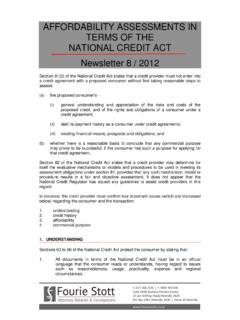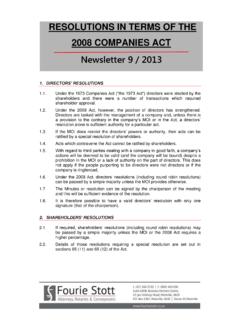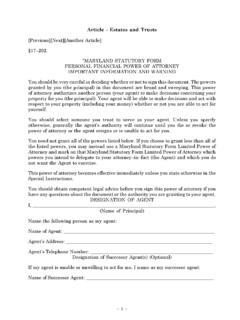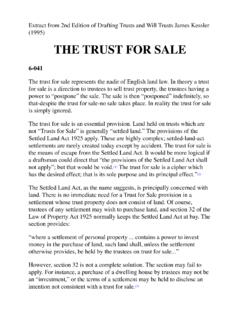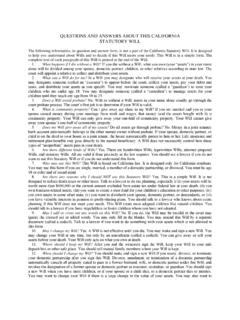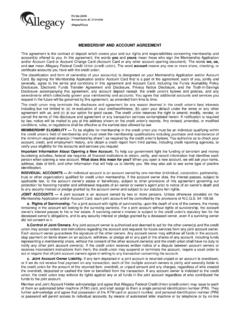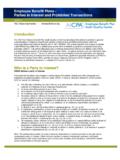Transcription of TRUSTS A BASIC GUIDE - Fourie Stott
1 TRUSTS A BASIC GUIDE Newsletter 3/2012 This document is intended to be a BASIC GUIDE on TRUSTS as a form of estate planning. Readers are advised to obtain specialist advice should they wish to form a trust . DEFINITION AND BASIC CONCEPTS A trust is a relationship in terms of which one person ( the founder ) transfers ownership (whether by donation or otherwise) of property to one or more other people ( the trustee/s ) to use and protect for the benefit of others ( the beneficiaries ). There must be a separation of ownership (or control) from the enjoyment of the property. A trust is not created if someone administers property for the benefit of himself. A trustee can also be a beneficiary but there should be other trustees and/or beneficiaries.
2 It is very important that the manner in which assets are transferred to a trust and the nature thereof are given careful consideration as, otherwise one could go through an expensive exercise in transferring the asset to the trust with no real benefit resulting. The administration of a trust is done in accordance with the provisions of the trust Property Control Act and the trust deed. ADVANTAGES OF A trust The advantages to placing assets in a trust for estate planning purposes include: A trust does not die. This means that a trust is not liable for estate duty, executor s fees or other taxes and costs which come into play on the death of a human being who owns property, although during the subsistence of the trust all usual fiscal rules ( income tax, CGT etc) apply as well as upon termination of the trust .
3 The value of any assets transferred to a trust is effectively frozen or pegged for estate duty purposes. If a loan account is created in the trust as a result of a disposal to the trust , that loan account will remain in the lender s estate but will not grow and can be reduced over time. Saving on estate duty (assets transferred will not be part of the original owner s estate and all growth in those assets will take place in the name of the trust and not in the original owner s estate). TRUSTS can continue to pay benefits to dependants (beneficiaries) after you die. This can be useful if you have dependants as money in your personal estate may not be available to your dependants until your estate has been wound up.
4 Benefits not yet awarded to beneficiaries cannot be attached if a beneficiary becomes insolvent or is sued by creditors. This benefit is applicable more to discretionary TRUSTS than to vesting TRUSTS . P a g e | 2 Tax-efficient income splitting. This is known as the conduit principle dividends which ordinarily would be subject to a high rate of taxation can be split between beneficiaries who are on a lower marginal rate of taxation. SARS has tried to restrict this benefit in recent years (dividends passed to minor children, for example, are taxed in the hands of the parent). The principle is that a trust should not be established merely to avoid tax. DISADVANTAGES OF A trust The disadvantages of placing assets in a trust for estate planning purposes include: The loss of legal control of assets.
5 Your assets are transferred to the trust and are managed by the trustees for the benefit of the beneficiaries. You no longer own the assets, but you can exercise some control over them by being a trustee. There should be an odd number of trustees to prevent a deadlock in voting. At least one trustee must be independent. One should exercise care when selecting trustees for example, a spouse could become an ex-spouse. You do not have the power to veto decisions, and you can be out-voted by the other trustees. Costs. One needs to weigh up whether the costs of establishing a trust may exceed any estate duty saving. The purpose of setting up the trust may be the determining factor. The costs of setting up and running a trust will include legal fees for drawing the trust deed and registering the trust , trustees fees for administering the trust , and audit fees (if the Master of the High Court insists that an auditor be appointed before he agrees to register the trust ).
6 The trustees need to ensure that they play an active and effective role in the administration of the trust . The penalties can be severe for absentee or puppet trustees. TAX CONSEQUENCES There are tax consequences to placing assets in a trust , which include the following: Income Tax - TRUSTS pay a flat rate of income tax of 40 percent on amounts not distributed to beneficiaries. Capital Gains Tax the effective rate of CGT is higher for a trust than for an individual. Also, if one s primary residence is held in a trust and that primary residence is sold, the CGT exemption on the first R1,5 million of capital gain is not available to the trust . Transfer Duty this is a tax on the acquisition of immovable property and used to be higher for a trust but, since 23 February 2011, the rates are the same.
7 Estate Duty TRUSTS do not pay estate duty but individuals do on their death if their estate exceeds the statutory threshold. Adverse tax consequences can be ameliorated by proper tax planning and parties considering forming a trust should get advice from a tax specialist on this aspect. DRAWING A trust DEED The following issues need to be considered before instructing a specialist to draw a trust deed: 1. The desired name of the trust . 2. The purpose or object of the trust . 3. The name of the founder. 4. The name of the proposed trustees (great care should be taken here). Previous experience in running a trust and a knowledge of accounting are highly recommended because it will minimize the risk of the Master requiring the trustees to put up security for the discharge of their duties.
8 P a g e | 3 5. The names of the beneficiaries and whether they are to be income or capital beneficiaries (or both). 6. Whether the trust is a discretionary or a vesting trust . In a discretionary trust the trustees have the right to decide how much income (or capital) to award to each beneficiary. Vesting TRUSTS can have complications in the event of the beneficiary s insolvency or death. 7. The rights and obligations of the trustees, including their powers, remuneration and meetings. 8. Rules and restrictions regarding the distribution of income and capital. 9. The duration and procedure on termination of the trust . 10. The procedure to be followed if the trust needs to be amended. 11. The name of the person who will do the trust s books (preferably an accountant) and whether the books of the trust need to be audited.
9 REGISTRATION OF A trust The following documents will need to be submitted to the Master of the High Court: 1. Two signed trust Deeds. 2. Proof of payment of the Master s fee of R100,00. 3. Acceptances of trust by each of the Trustees in duplicate. 4. A copy of the first page of the Identity Document of each of the Trustees signed by the person to whom it relates. 5. Proof of the trustees residential addresses. 6. A summary of the proposed trustees qualifications and experience in running TRUSTS . The Master must be satisfied that the trustees will be competent in discharging their duties. If he is not so satisfied, he may call for the trustees to put up security and he may insist that the trust be audited. 7.
10 Details of the bank (and branch) at which the bank account of the trust will be opened. 8. An undertaking by the Accountant to administer the books of the trust in accordance with generally accepted accounting practice. The trust also needs to be registered with SARS as a taxpayer. THE RUNNING OF A trust Trustees cannot contract on behalf of a trust until they receive Letters of Authority from the Master of the High Court. The trustees need to be very clear on their duties in respect of a trust . This responsibility is not to be taken lightly. A schedule setting out some of a Trustee s duties is set out below: Duty Cross-reference to section of Reference to trust Property Control Act or Case Law 1.
